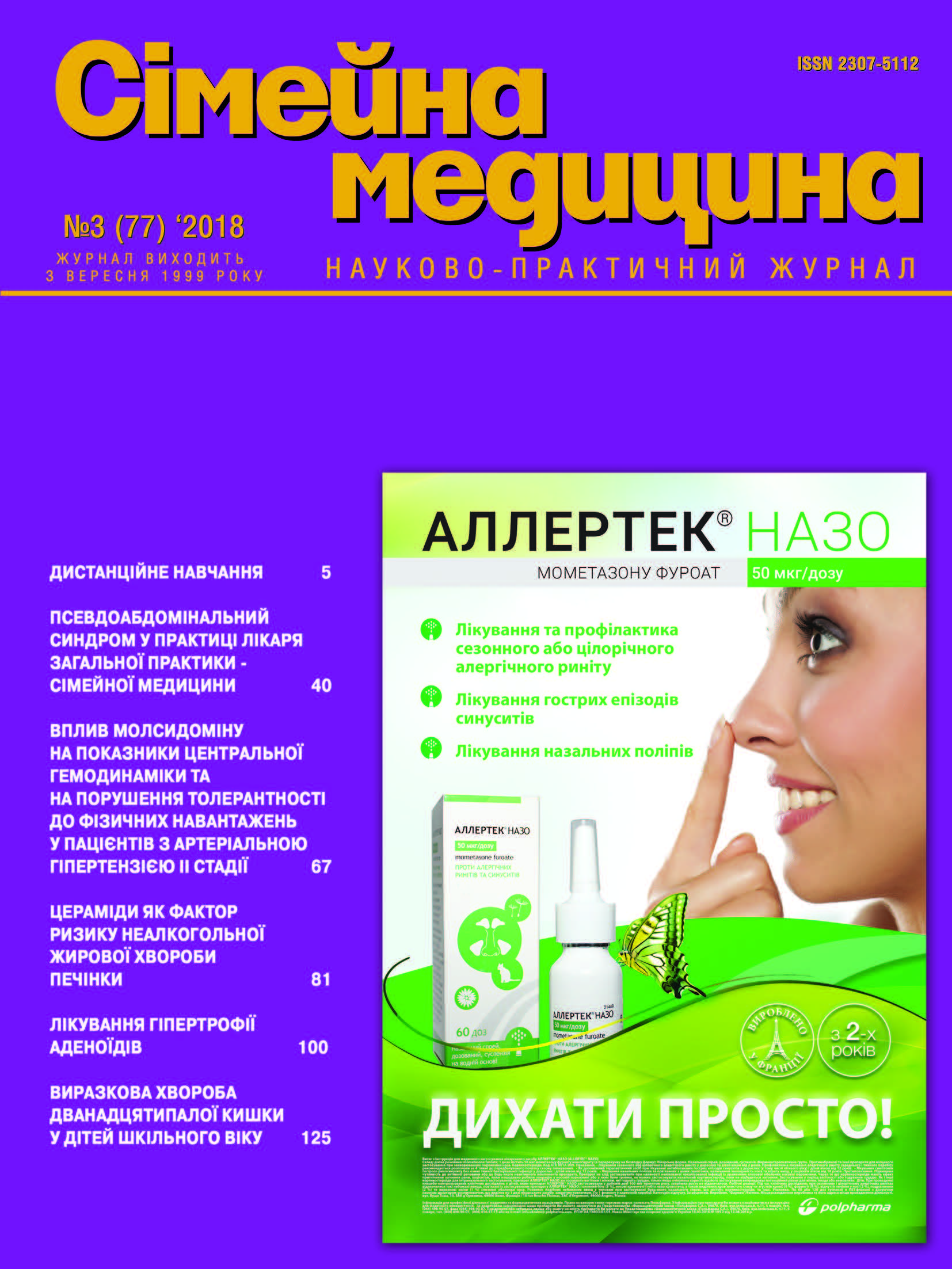Autonomic and psychosomatic disorders in women during pregnancy
##plugins.themes.bootstrap3.article.main##
Abstract
The article describes the subjective and objective signs of autonomic violations from the standpoint of neurological status and psychosomatic disorders.
The objective: is to improve the quality of autonomic dysfunction diagnosis in pregnant women by the results of the autonomic and psychosomatic state study.
Materials and methods. 487 pregnant women of all gestation periods registered in women’s consultations, in the Ivano-Frankivsk City Clinical Maternity Hospital and the Kyiv City Center of Reproductive and Perinatal Medicine were examined. The study design contained a full range of clinical, laboratory and instrumental methods.
Results. From all 487 examined women 172 (35,31%) pregnant had autonomic dysfunction. Depending on the changes in autonomic homeostasis and psychosomatic symptoms, autonomic dysfunction syndrome in 112 (22,99%) pregnant women and somatoform dysfunction of the autonomic nervous system in 60 (12,32%) pregnant women were diagnosed with available psychosomatic symptoms and functional changes of heart and vessels. Hypertonic form of autonomic dysfunction wasdiagnosed in 72 (41,86%) pregnant women, hypotonic – in 61 (35,46%) cases and cardiac type – in 39 (22,67%) patients. Pregnant women with SD ANShave an increased level of personal anxiety – 62,0±4,44 points, that was significantly higher than in the control group 22,0±2,88.
Conclusions. The conducted studies allowed to confirm a high percentage of autonomic disorders in pregnant women at different periods of gestation. The presence of autonomic imbalance during pregnancy can be considered as autonomic visceral dysfunction and psychosomatic pathology, which arises due to the suprasegmental autonomic structures regulatory violations. Pregnant women with autonomic dysfunction are characterized by an increased level of anxiety, which may be a risk factor for the perinatal complications.##plugins.themes.bootstrap3.article.details##

This work is licensed under a Creative Commons Attribution 4.0 International License.
Authors retain the copyright and grant the journal the first publication of original scientific articles under the Creative Commons Attribution 4.0 International License, which allows others to distribute work with acknowledgment of authorship and first publication in this journal.
References
Абдуєва Ф.М. Вегетосудинна дистонія чи соматоформна дисфункція вегетативної нервової системи серця? / Ф.М. Абдуєва, Е.П. Каменська // Вісник Харківського національного університету імені В.Н. Каразіна. – 2012. – № 998, серія «Медицина», Випуск 23. – С. 102–104. PDF
Бенюк В.О. Прогнозування перебігу гестозу в сучасних умовах / В.О. Бенюк, І.В. Майданник // Актуальні проблеми клінічної та профілактичної медицини. – 2014. – Т. 2, № 2–3. – С. 60–64. PDF
Вейн А.М. Вегетативные расстройства. Клиника, диагностика, лечение / А.М. Вейн. – М.: МИА, 2003. – 752 c.
Гиндикин В.Я. Справочник: соматогенные и соматоформные психические расстройства. – М.: Триада-Х, 2000. – 256 с.
Гудков Г.В. Комплексное исследование функціонального состояния вегетативной нервной системы у беременных с гестозом / Г.В. Гудков, А.В. Поморцев, О.К. Федорович // Акушерство и гинекология. – 2001. – № 3. – С. 45–50.
Довженко Т.В. Взаимосвязь аффективных и сердечно-сосудистых расстройств / Т.В. Довженко // Социальн. и клин. психиатр. – 2006. – Т. 15, вып. 3. – С. 69–80.
Дубницкая Э.Б. Психосоматические соотношения при депрессиях у больных с соматическими заболеваниями // Психиатрия и психофармакотерапия. – 2000. – Т. 2, № 2. – С. 40–44.
Заседа Ю.И. Эволюция представлений о соматоформных расстройствах и психосоматических заболеваниях / Ю.И. Заседа // Мед. психология. – 2013. – № 4. – С. 46–50. PDF
Малярська Н.В. Вегетативні симптоми – психосоматичні розлади / Н.В. Малярська // Science and Education a New Dimension. Natural and Technical Sciences. – 2015. – III (7). Issue: 58. – P. 21–23.
Подольский В.В. Репродуктивное здоровье женщины – важнейшая проблема современности // Здоровье женщины. – 2003. – № 1 (13). – С. 100–102.
Подольський Вл.В. Особливості менструальної функції та її корекція в жінок зі змінами репродуктивного здоров’я і порушеннями вегетативного гемостазу / Вл.В. Подольський // Актуальні питання педіатрії, акушерства та гінекології. – 2015. – № 2. – С. 150–153. https://doi.org/10.11603/24116-4944.2015.2.4809
Подольський Вл.В., Подольський В.В. Лікування змін мікробіоценозу урогенітальних органів у жінок з порушеннями вегетативного гомеостазу та змінами репродуктивного здоров’я / Вл.В. Подольський, В.В. Подольський // Здоровье женщины. – 2015. – № 10. – С. 44–46.
Пригожин Л.О. Соматоформные расстройства. Диагностика, лечение, профілактика / Клинические рекомендации. – М.: Медицина, 2015. – 22 с.
Соматоформные расстройства в практике семейного врача / В.Ю. Приходько, И.Р. Микропуло, М.В. Олейник [і ін.] // Медичні перспективи. – 2013. – № 3. – С. 5–7. PDF
Соматоформні розлади – сучасна загально-медична проблема / Б.В. Михайлов, І.М. Сарвір, О.С. Баженов [та ін.] // Укр. мед. часопис. – 2003. – № 3. – С. 73–77. PDF
Сюсюка В.Г. Оцінка впливу програми медико-психологічної корекції психоемоційної дезадаптації у вагітних на перинатальні наслідки їх розродження / В.Г. Сюсюка // Перинатология и педиатрия. – 2016. – № 3 (67). – С. 43–48. https://www.doi.org/10.15574/PP.2016.67.43
Татарчук Т.Ф. Діагностика, профілактика та лікування передменструального синдрому (методичні рекомендації) / Т.Ф. Татарчук, І.Б. Венцківська, І.С. Майдан. – К., 2005. – 20 с.





